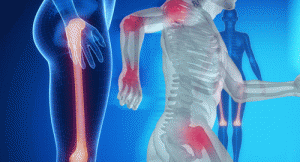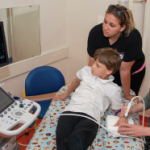 Established in 2010, the Ultrasound School of North American Rheumatologists (USSONAR) has graduated nearly 300 rheumatologists from an intensive, eight-month training program. USSONAR aims to foster training, establish standards and promote research in musculoskeletal ultrasound (MSUS), according to the organization’s website.
Established in 2010, the Ultrasound School of North American Rheumatologists (USSONAR) has graduated nearly 300 rheumatologists from an intensive, eight-month training program. USSONAR aims to foster training, establish standards and promote research in musculoskeletal ultrasound (MSUS), according to the organization’s website.
“Acquiring MSUS proficiency not only helps improve diagnostic certainty and procedural accuracy, but also requires an understanding of anatomy and the changes in anatomy caused by rheumatic diseases,” says Eugene Kissin, MD, USSONAR program director and associate professor of medicine and program director of the Boston University Medical Center. “My hope is that, through teaching MSUS to rheumatology fellows, our specialty as a whole will not only take ownership of an additional tool for assessment and treatment of rheumatic conditions, but will develop a deeper understanding of anatomy and improved clinical examination skills in general.”
Dr. Kissin, whose interest in MSUS began in 2003, used funds from the Rheumatology Research Foundation’s Clinician Scholar Educator Award to develop the teaching program for USSONAR. He recently took some time to chat with The Rheumatologist.
Question: Tell me about USSONAR.
Answer: A small group of rheumatologists [who were] enthusiastic about the potential for MSUS in rheumatology practice formed USSONAR to help standardize training and facilitate education in MSUS—especially for rheumatologists without a local mentor. USSONAR is not-for-profit, and all the funds we receive through fees or donations go directly to sponsoring MSUS education for rheumatology fellows. We have developed extensive online materials in both written and video formats to help teach ultrasound evaluation of the joints and soft tissues, with a focus on rheumatic diseases, as opposed to joint and soft tissue trauma. We also offer a rigorous, blended-learning program to both fellows and post-fellowship rheumatologists.
Q: What do you find most exciting about the program?
A: The thing that excites me most about USSONAR is our development of a growing community of rheumatologists who share and develop ideas about the best strategies for imaging and monitoring of—and teaching about—rheumatic diseases.
Q: For clinicians around the country, what are the key takeaways from your research and work with the program?
A: If you want to learn MSUS and are willing to put in the effort, but need help with either access to standardized teaching materials and/or remote mentoring, USSONAR is available to you, no matter where in your career you are.
Q: What are the obstacles the program faces right now, and in the long run?
A: The greatest obstacle we face is having sufficient capacity to satisfy the demand for MSUS education. … We are constantly expanding our teaching capacity by recruiting and developing our most successful program graduates into mentors. We are also experimenting with emerging technologies to help improve the distance learning of larger numbers of participants.
Q: What is your ‘elevator speech’ to rheumatology program directors?
A: Ninety percent of rheumatology fellowship programs in the U.S. offer some form of training in MSUS, and this is becoming one of the fellowship features demanded by fellow applicants. If you need help developing faculty member training in MSUS or need help training your fellows, reach out to us.
Richard Quinn is a freelance writer in New Jersey.
